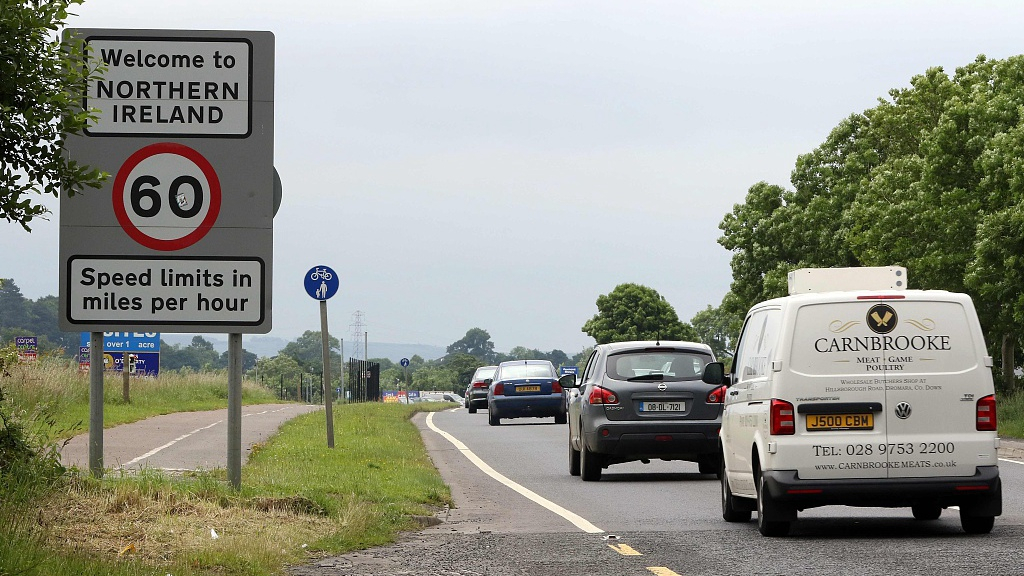

Editor's note: Chris Deacon is a postgraduate researcher in politics and international relations at the University of London and previously worked as an international commercial lawyer. The article reflects the author's views, and not necessarily those of CGTN.
New UK Prime Minister Boris Johnson traveled to Berlin on August 21 to discuss the future of the Brexit process with German Chancellor Angela Merkel, hoping to achieve a breakthrough regarding the “Irish backstop” element of the Brexit withdrawal agreement in particular.
The backstop is the key sticking point in the agreement negotiated by former Prime Minister Theresa May with the European Union. It seeks to avoid a so-called “hard border” on the island of Ireland. Currently, for most purposes the UK and Ireland treat the Common Travel Area (CTA) between the two countries as a single territory. Irish citizens, for example, are entitled to virtually all rights that British people are while they reside in the UK.
As the name of the CTA suggests, there is also complete freedom of travel across the border between the two countries. Indeed, the border is not even marked such that it would be difficult for most people to even realize they had crossed into another country. Homes, businesses and schools all straddle the invisible border.
One of the main foundations of these rules is the Good Friday Agreement, which sought to end the “troubles” in Northern Ireland, driven by sectarian divisions between unionists and republicans.

Vehicles are crossing the control-less border from Donegal, Ireland into Northern Ireland, June 25, 2016. /VCG Photo
The existence of these rules has been facilitated by both the UK and Ireland being members of the EU, including its Single Market and Customs Union. This means that both countries follow the same rules for the movement of goods and other standardized rules, allowing a free flow across the border.
However, once the UK leaves the EU and its institutions, the border between Northern Ireland and the Republic of Ireland will become an external EU border. In order to defend the integrity of the EU’s institutions it will be necessary, therefore, to have checks on the border.
Such a hard border could pose a major threat to the continued peace in Northern Ireland. The backstop was brought into the withdrawal agreement to try to prevent such an eventuality by attempting to keep the UK within certain EU institutions unless and until such a time as alternative arrangements can be found to replace the possibility of a hard border.
Brexit supporters in the UK, however, have been vehemently opposed to the existence of this backstop as they see it as a trap that could keep the UK within the EU in all but name in perpetuity. They argue that if alternative arrangements are a possibility, they should be brought in now so as to remove the need for a hard border.
Boris Johnson has also been clear that he will not agree a deal with the EU unless the backstop is removed. In his press conference with Angela Merkel, he accepted that the “onus” was on the UK to come up with a solution to this problem, with Merkel insisting that there were only 30 days left to do so.

British Prime Minister Boris Johnson speaks to the media outside 10 Downing Street in London, England, UK, July 24, 2019. /VCG Photo
This puts huge pressure on the UK’s resources to do something in one month which has apparently been impossible in the last two years. Somewhat bizarrely, Johnson claimed in the press conference that he was “more than happy” with Merkel’s deadline – likely exasperating the civil servants working on this in the background in the process.
It is certainly encouraging for Johnson and his allies that Merkel has suggested there is any possibility of progress here, when the EU has been quite adamant for some time that there will be no withdrawal agreement without the backstop. But in putting the onus entirely on the UK to find a solution, Merkel is hardly committing to much.
The EU’s position has always been that, while alternative arrangements driven by new advances in border technology may emerge in the future, they do not currently exist. In suggesting that the UK might be able to create a solution in the nearer term, Merkel is not contradicting this line.
On the contrary, in her words on August 21, Merkel is firmly placing the ball in the UK’s court, the subtext being: you go away and work this out if you want to try, but it’s entirely on you if you don’t manage it. Johnson’s willing acceptance of that responsibility must have been a strategic error on his part.
It cannot be overestimated how much of a gamble Johnson is taking in agreeing to this challenge – likely an impossible one. When, invariably, the UK finds it impossible to create a solution in time, it will be difficult to put the blame anywhere other than entirely on 10 Downing Street.
(If you want to contribute and have specific expertise, please contact us at opinions@cgtn.com)

Copyright © 2018 CGTN. Beijing ICP prepared NO.16065310-3
Copyright © 2018 CGTN. Beijing ICP prepared NO.16065310-3